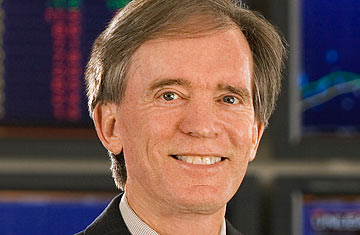
Bill Gross, co–chief investment officer at Pacific Investment Management Co.
(2 of 2)
Given your scenario of weakness later in 2010, will there be a premium on safety, like Treasury bonds and notes?
I'd be careful about this continuing assumption that U.S. Treasuries are the place to go. There are a number of reasons to have doubts about Treasuries, not just because of America's sovereign risk but also from the standpoint of an overowned currency [the dollar]. Add on to those concerns the comments from Chinese authorities and others. They haven't said they're up to their neck in Treasuries, but you know they're getting close.
So maybe cash becomes the best asset class of 2010?
I'm not being wishy-washy here, but cash doesn't earn anything. There's the Will Rogers quote about being more concerned about the return of your money, but you also have to be concerned about the return on your money, and there's nothing [being paid] by cash and Treasury bills. At Pimco we would probably try and substitute for our Treasuries with sovereign bonds of potentially higher quality. Germany looks interesting to us. Germany has problems, but it's in a much better budget situation than the U.S. because of a constitutional amendment three months ago that forces a balanced budget in four years.
Given all the crosscurrents, what will the investor's world look like in the years ahead?
In a new-normal world, growth will be half of what it was, profit growth will be half of what it was, and returns on almost all assets — including bonds — will be half of what we've grown used to. Further, the U.S. economy and other [developed] economies have provided as a whole 7% to 9% returns over the past 10, 20 years, and investors got used to that. That's one of the reasons why states and pension funds with the long-term liabilities matched to expectations for double-digit types of returns are facing problems — now they are suddenly having to come to grips with the potential reality of half-sized returns. I think increasingly in 2010 the market will begin to adjust to that.
Meaning ...
Over the past six to nine months, the 60% pop off the bottom, not just for stocks but for high-yield bonds, etc., is indicative of a return in perspective to the old normal as opposed to the new normal. We think that 2010 will be tempered, and that doesn't mean bear markets, but it does mean a growing realization that we have a lot of problems and the markets aren't necessarily priced for it.
Would a second federal stimulus package improve your outlook?
It would help the economy, and if applied through Fed programs in terms of outright purchases of assets, yes, I think it would help the markets. I do sort of expect another stimulus program in 2010 at some point, but it can't be a big one, because the American public and indeed the rest of the world is increasingly demanding some type of fiscal discipline.
